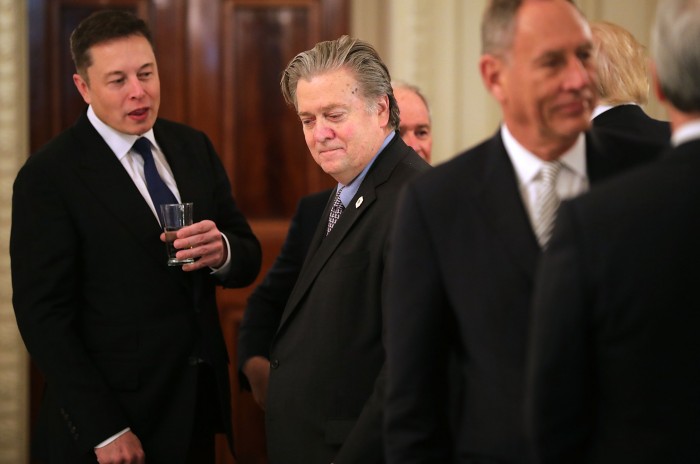Tech Companies Say Trump’s Immigration Ban Is Bad for Business

With the Trump administration’s immigration ban in limbo in federal court, tech companies are taking the opportunity to weigh in.
News emerged Sunday night that 97 companies, most of them from the tech sector, had filed an amicus brief opposing the president's executive order calling for a 90-day ban on immigrants from seven predominantly Muslim nations and a 120-day ban on all refugees. The 20-page brief comes after the ban was suspended Friday by a federal judge in Seattle, and the Court of Appeals for the Ninth Circuit denied a request by the Department of Justice to issue an emergency stay on the ruling.
The brief, whose signatories include Google, Microsoft, Netflix, Airbnb, Uber, and PayPal, among many others, argues that the ban isn’t just unconstitutional—it’s bad for business:
Immigrants make many of the Nation’s greatest discoveries, and create some of the country’s most innovative and iconic companies. Immigrants are among our leading entrepreneurs, politicians, artists, and philanthropists. The experience and energy of people who come to our country to seek a better life for themselves and their children—to pursue the “American Dream”—are woven throughout the social, political, and economic fabric of the Nation.
It goes on to state that the ban “is inflicting substantial harm on U.S. companies,” mainly because it “hinders the ability of American companies to attract great talent” and “makes it more difficult for American firms to compete in the international marketplace.” You can read the brief in its entirety here, and the full list of participating companies here.
Notably absent from the brief were IBM, Cisco, and Palantir, the software company cofounded by Peter Thiel, one of Silicon Valley’s most prominent Trump supporters. Tesla, whose CEO Elon Musk is part of a special advisory group to President Trump, also didn’t sign on to the brief.
Tesla’s initial absence sparked criticism that Musk was attempting to curry favor with the new president, perhaps because two of his companies, SpaceX and Tesla, rely heavily on government contracts and tax breaks. For his part, Musk has publicly objected to the immigration ban, while arguing that continued dialogue with the Trump administration is the best way to achieve his goal of moving the world away from fossil fuel-based sources of energy. Tesla and SpaceX later joined the brief.
The Department of Justice is expected to file its justification for the ban by late afternoon on Monday, and a decision could come from a panel of three of the appellate court's judges by the end of the week. No matter how they decide, the case may very well end up before the Supreme Court.
(Read more: Bloomberg, Quartz, Reuters)
This story was updated on February 7, 2017, to include news that Tesla and SpaceX had joined the amicus brief.
Keep Reading
Most Popular
Large language models can do jaw-dropping things. But nobody knows exactly why.
And that's a problem. Figuring it out is one of the biggest scientific puzzles of our time and a crucial step towards controlling more powerful future models.
The problem with plug-in hybrids? Their drivers.
Plug-in hybrids are often sold as a transition to EVs, but new data from Europe shows we’re still underestimating the emissions they produce.
How scientists traced a mysterious covid case back to six toilets
When wastewater surveillance turns into a hunt for a single infected individual, the ethics get tricky.
Google DeepMind’s new generative model makes Super Mario–like games from scratch
Genie learns how to control games by watching hours and hours of video. It could help train next-gen robots too.
Stay connected
Get the latest updates from
MIT Technology Review
Discover special offers, top stories, upcoming events, and more.